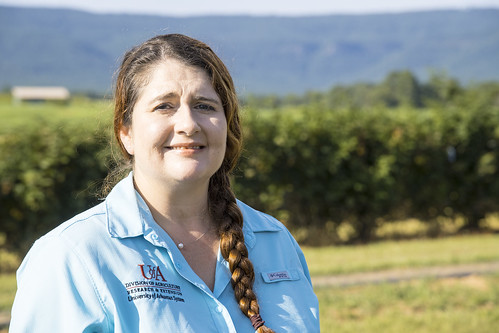Horticultural IPM specialist appointed director of Fruit Research Station
By Fred Miller
U of A System Division of Agriculture
@AgNews479
Fast Facts:
- Jackie Lee named resident director of the Division of Agriculture Fruit Research Station
- Lee is first woman to direct a Division of Agriculture research farm
- Plans to expand support of research priorities, build up educational programs
(620 words)
Download related PHOTOS from Flickr: https://flic.kr/s/aHsmGckEKc
CLARKSVILLE, Ark. — Jackie Lee, associate professor and horticultural integrated pest management specialist for the University of Arkansas System Division of Agriculture since 2016, has been appointed resident director of the Arkansas Agricultural Experiment Station’s Fruit Research Station.

Lee has already been on the job since July, co-directing the station with Dan Chapman, who has served as resident director since 1997 and plans to retire the end of August.
“We are very pleased to have Dr. Jackie Lee take over as resident director at the Fruit Research Station north of Clarksville,” said Mark Cochran, University of Arkansas System vice president for agriculture. “Dr. Lee established a great reputation for her many contributions as an associate professor of horticulture and IPM extension specialist. She brings a wealth of expertise, experience and energy to her new role. She will provide excellent and important leadership to managing this internationally-renowned research station.
“Dr. Lee will also be the first female director of one of our research stations,” Cochran said.
“Jackie is uniquely qualified to take the reign of the Fruit Research Station,” said Jean-François Muellenet, associate vice president-agriculture and director of the Agricultural Experiment Station. “She has ambitious goals for the station and I look forward to working with her to implement her vision.”
A native of Mt. George, Ark., located near Dardenelle in Yell County, Lee earned a bachelor’s degree in biology from Arkansas Tech University, and a master’s degree and Ph.D., both in entomology, from the University of Arkansas.
After completing her doctorate, Lee worked as a research scientist for Dow AgroSciences, working her way up to senior biologist in research and development. After five years, Lee became an extension entomologist and pesticide coordinator for Oklahoma State University, leaving there in 2016 to join the University of Arkansas System Division of Agriculture.
“I spent eight years outside the state and just kind of circled around and came back to where I started,” Lee said.
Since joining the Division of Agriculture, Lee has had a research appointment with the Arkansas Agricultural Experiment Station and a specialist appointment with the Cooperative Extension Service. “My program focused on applied research to learn new techniques, and educating stakeholders,” she said.
Having one foot in research and the other in extension has given Lee a unique vision for steering the Fruit Research Station’s future.
“The station’s priority will continue to be supporting fruit researchers, especially the breeding programs,” Lee said.
The Clarksville station has a world-renowned blackberry breeding program — Arkansas blackberries are grown on every continent but Antarctica. It also has nationally and internationally known breeding programs in grapes, peaches and nectarines and blueberries, and a relatively new and growing program for muscadines.
“My vision is to grow the station, adding acres to accommodate new and expanding research programs,” Lee said. “I also want to get more researchers involved, adding or expanding programs in integrated pest management, greenhouse systems and more.”
The Fruit Research Station has already been adding research programs, Lee noted. For example, extension fruit and vegetable horticulture specialist Amanda McWhirt has been conducting research on new trellising systems for berry production.
“We have good resources here to help scientists accomplish their research goals,” Lee said.
The station has long hosted fruit production workshops, and Lee wants to expand those educational opportunities, holding regular pruning workshops and other programs.
Lee also wants to grow relationships with fruit producers and markets, hosting grower association meetings and other outreach efforts.
“I want to make sure the people of Arkansas know where we are and what we offer,” Lee said.
To learn more about Division of Agriculture fruit research and breeding, visit the Arkansas Agricultural Experiment Station website: https://aaes.uark.edu. Follow us on Twitter at @ArkAgResearchand Instagram at ArkAgResearch.
About the Division of Agriculture
The University of Arkansas System Division of Agriculture’s mission is to strengthen agriculture, communities, and families by connecting trusted research to the adoption of best practices. Through the Agricultural Experiment Station and the Cooperative Extension Service, the Division of Agriculture conducts research and extension work within the nation’s historic land grant education system.
The Division of Agriculture is one of 20 entities within the University of Arkansas System. It has offices in all 75 counties in Arkansas and faculty on five system campuses.
Pursuant to 7 CFR § 15.3, the University of Arkansas System Division of Agriculture offers all its Extension and Research programs and services (including employment) without regard to race, color, sex, national origin, religion, age, disability, marital or veteran status, genetic information, sexual preference, pregnancy or any other legally protected status, and is an equal opportunity institution.
Media Contact: Fred Miller
U of A Division of Agriculture
Arkansas Agricultural Experiment Station
(479) 575-5647
fmiller@uark.edu
Related Links